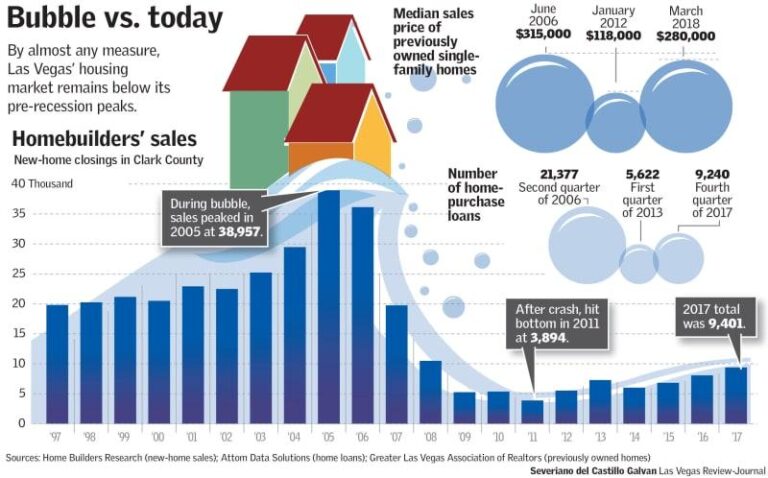Las Vegas Housing Market Faces Rising Bubble Concerns Amid Soaring Prices
Las Vegas is currently witnessing an extraordinary escalation in housing costs, prompting leading economists to voice serious concerns about the emergence of a real estate bubble in the city. This rapid price inflation, driven by a surge in demand coupled with a constrained housing supply, echoes patterns observed before previous market downturns. The situation is further intricate by evolving economic policies and tighter credit conditions, leading analysts to question whether Las Vegas is approaching a critical housing market correction.
Economists Highlight Alarming Trends in Las Vegas Housing Prices
Market experts have identified a sharp acceleration in home prices across Las Vegas over the last twelve months, a trajectory that raises red flags reminiscent of earlier real estate crashes. This surge is largely attributed to historically low interest rates, a wave of buyers relocating from other states, and a persistent shortage of available homes. Notably, housing price growth has substantially outstripped wage increases, intensifying concerns about affordability and the possibility of speculative investment inflating the market.
Key indicators that economists are closely monitoring to detect early signs of a market downturn include:
- Elevated home price-to-income ratios signaling increased financial pressure on local residents.
- Surging investor participation perhaps driving prices beyond sustainable levels.
- Growing mortgage delinquency rates which may reflect overextension among borrowers.
Recent comparative data underscores the stark contrast between Las Vegas and national averages:
| Metric | Las Vegas | U.S. Average |
|---|---|---|
| Year-over-Year Home Price Increase | 18% | 9% |
| Price-to-Income Ratio | 7.8 | 4.5 |
| Mortgage Delinquency Rate | 3.2% | 2.1% |
Unsustainable Market Dynamics Signal Potential Housing Bubble
Data from recent months reveals that Las Vegas’ housing price growth is significantly outpacing local income gains, a trend that has economists worried about the market’s long-term viability. This rapid appreciation is largely driven by speculative purchases and a scarcity of affordable housing options, both of which are classic precursors to market corrections. Analysts point to soaring price-to-rent ratios and price-to-income multiples as evidence that current valuations may not be economically justified and could soon face downward pressure.
The risks are intensified by a growing number of investors focused on short-term profits rather than sustainable ownership.The following table compares critical market metrics between Las Vegas and the national landscape, highlighting the widening gap:
| Metric | Las Vegas | U.S. Average |
|---|---|---|
| Price-to-Rent Ratio | 29.4 | 19.7 |
| Price-to-Income Multiple | 7.2 | 4.5 |
| Months of Inventory Supply | 1.8 | 3.5 |
- Elevated borrowing levels increase sensitivity to interest rate hikes.
- Decreasing housing affordability excludes many local families from homeownership.
- Overextended construction activity risks a sudden downturn if demand falters.
Economic Implications of an Overheated Las Vegas Housing Market
Industry specialists caution that the rapid price escalation in Las Vegas’ housing sector could trigger significant economic instability. The combination of unchecked demand and speculative investment has pushed prices beyond levels supported by fundamental economic factors, creating a precarious market environment. Potential consequences include:
- Rising mortgage defaults: Homeowners with stretched finances may default if borrowing costs increase.
- Market volatility: Heavy reliance on speculative gains could precipitate abrupt price corrections.
- Reduced community diversity: Affordability challenges may limit access for long-term residents.
Experts advocate for vigilant regulatory oversight and prudent lending standards to mitigate these risks. The table below presents key indicators that reflect the current fragility of the housing market:
| Indicator | Current Level | Past Average |
|---|---|---|
| Home Price Index | 215 | 150 |
| Mortgage Delinquency Rate | 5.2% | 2.8% |
| Inventory Supply (Months) | 1.4 | 4.5 |
Strategic Policy Actions Proposed to Stabilize the Market and Support Buyers
To address the overheating housing market in Las Vegas, economists recommend a series of targeted policy interventions aimed at tempering speculative activity and expanding affordable housing availability. Key strategies include tightening mortgage lending criteria to discourage risky borrowing and imposing stricter regulations on short-term rental properties,which have contributed to the housing shortage. Additionally, boosting investment in affordable housing developments is seen as essential to easing price pressures and assisting first-time homebuyers.
Recommended policy initiatives encompass:
- Increasing down payment requirements for investment property purchases
- Implementing rigorous registration and oversight of rental properties
- Providing tax credits and incentives to developers focused on affordable housing
- Expanding assistance programs tailored to low-income and vulnerable homebuyers
| Policy Measure | Anticipated Outcome |
|---|---|
| Mortgage Lending Restrictions | Curtail speculative purchases |
| Short-Term Rental Controls | Enhance housing stock availability |
| Affordable Housing Incentives | Increase supply for low- and moderate-income buyers |
| Homebuyer Support Programs | Improve market accessibility |
Looking Ahead: Navigating the Future of Las Vegas’ Housing Market
As leading economists continue to express concern over the rapid escalation of housing prices in Las Vegas, the trajectory of the city’s real estate market remains uncertain. While the current boom has generated economic optimism, the looming threat of a bubble burst could have widespread repercussions for homeowners and the broader economy. Policymakers, investors, and community stakeholders must vigilantly track market developments and implement prudent measures to foster sustainable growth. The coming months will be pivotal in determining whether Las Vegas can sidestep the pitfalls of previous housing crises or if it faces an imminent market correction.




